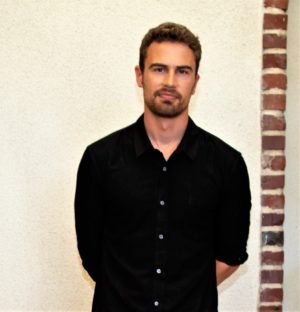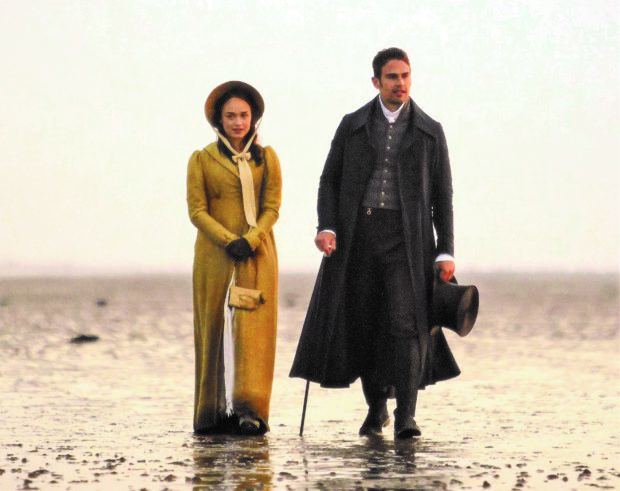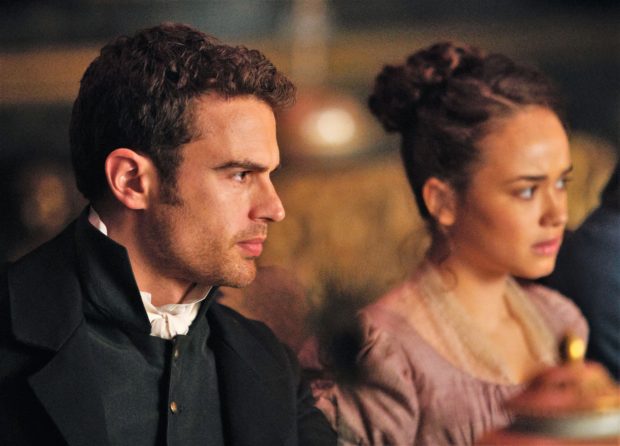Theo James: From ‘Divergent’ to ‘Sanditon’
LOS ANGELES—Theo James’ TV series, “Sanditon,” has just begun, but he’s already making waves. In the second episode of the series based on Jane Austen’s unfinished novel of the same name, Theo got the social media buzzing with his naked scene.
In the final minutes of the episode, Theo, playing Sidney Parker, emerged from the sea completely nude and exposed his bottom. Rose Morrison, who portrays the coy Charlotte Heywood, got flustered as she paddled in the water.
Theo, noted for his roles in “The Divergent” series (as Four), “The Dark Crystal: Age of Resistance” (Rek’yr), the “Underworld” series (David) and “Downton Abbey” (Kemal Pamuk), was quoted as saying to Radio Instances:
“If there’s going to be any nakedness, it must be there for a story purpose, after which it is effective. It is pretty pointless to have somebody whipping their package off for the sake of it….”
Excerpts from our interview with the 34-year-old actor:
Article continues after this advertisementDid you know Jane Austen had this unfinished novel, “Sanditon”? To be honest, I didn’t have that much knowledge of it. I read Jane Austen a lot in school, but I didn’t know anything about “Sanditon.” It’s basically eight chapters of her last piece of work and then she died. So, it’s later in her career, which is interesting.
Article continues after this advertisementHer writing changed and it was evolving and also in terms of the social dynamic in Regency Britain. At the time, things were changing quite a lot. But I also think the fascination is with Jane Austen. There are many adaptations of her novels and I guess the idea of doing one that hasn’t ever been done before was a strong pull for the producers.
That and combined with the ability of someone like Andrew Davies who is the preeminent adapter of those great pieces of classic writing—those two combinations made real sense and for him to continue the story. He brings real legitimacy to it.
It would have been hard without someone who’s as well-known and respected as Andrew to take on a Jane Austen work that was unfinished.
Jane Austen’s heroines were women who were ahead of their time. How do her works resonate with you, who grew up with women? How much awareness did you have early on about the positive influence of women in your life? It’s very present from early on. Not only do I have sisters, but my mom raised five kids. She worked her entire life.
She began essentially as an occupational therapist, which is a version of a nurse, then worked her way up to commissioning for one of the largest councils in Britain.
She is a very strong female presence in my life. I was aware of women’s rights, their abilities and strengths and how the balance is always not tipped in women’s favor. So that awareness has been present my entire life.
It is a huge theme in Jane Austen’s novels and in “Sanditon” particularly, about women’s roles, and the oppressive forces of male dominance. That’s why the show is really interesting.
You celebrated your first wedding anniversary. Did your marriage change the way you pick projects? I think so. When you are starting out, you are a young actor and you are kind of hustling, you are probably willing to sacrifice a lot or most things.
Whereas when you get older and a bit longer in the tooth, you realize that work is important, but life is more important or just as important.
In any career, it’s easy to get stuck in a rut of being obsessed with what the next job is and how you are going to progress, etcetera.
But life is extremely short and living life is more important than being obsessed.
Does it help that both you and your wife, Ruth Kearney, are in the industry? Yeah, that makes it easier. If you are both actors, you understand the world, how things can change very quickly and how you might be away for three months.
Do you live in Hollywood or London? I live just under the “O” in the Hollywood sign. No, I’m kidding (laughs). I sleep in a sleeping bag. No, I live in London and LA.
Do you feel like a British actor when you are in LA? I definitely feel British, but I’ve ended up working here a lot and I love the state of California. It’s amazing. I grew up in a very suburban kind of satellite town in London.
So, being here when I can for half the year or a portion of the year is great, because it’s so different from the way I grew up—the sun, beach, environment and being able to see and visit everything that California has to offer. So yeah, it’s very much a part of my life, but I’m still a very snooty Brit.
It’s hard to detect your snootiness. Of course (laughs). I’m a nun essentially, or a priest.
Can you also talk about your coming film, “Archive”? Aside from starring in it, were you also the executive producer? I produced it actually. “Archive” is a really interesting script that I read about two years ago. It’s by Gavin Rothery who is a friend and a good new director. He was an art designer and he designed all the sets and everything essentially for the film “Moon,” that great Sam Rockwell movie.
He is also a great writer. He wrote the script, which has some DNA in the “Moon” world.
We developed “Archive” along with Phil Herd, his other producer for several years.
For me, it was important because it was the first thing that I produced. With age and experience, I’ll be moving more and more into that (directing). So, producing “Archive” was a defining moment for me.
Were there actors in your family who inspired you? They were very encouraging, but there were no actors in the family. But being the youngest, I was obviously always striving for attention. My mom’s auntie was a musician and a cabaret singer, but I think that’s pretty much it.
How did you become interested in acting? My parents used to make me do short tap dancing numbers on the streets in London for coins (laughs). No, I just did it at school, then I did it at University (of Nottingham). After university, I was figuring out what I was going to do and I went to the Old Vic, which is this drama school (Bristol Old Vic Theatre School) essentially.
Can you talk about your fight against plastic packaging? Plastic is obviously a massive problem in Britain. They started doing this thing where you are paying for plastic. They have all these stats that say that amount of plastic tonnage that has been used has been reduced by 74 percent or whatever it is.
But there’s the other way of doing it, which is to completely ban plastic. Kenya did that and I know there’s been some interesting blowback from that. But they cut it out completely.
That’s the way we should go, because plastic is getting to every part of the planet that is physically possible. We saw that in the bottom of the Mariana Trench—how there were plastic particles there.
You are also an activist, championing Syrian refugees who have been displaced from their homes. I am doing as much as I can, but not enough. I have talked to the UN to bring light on the situation, raise money, but it’s not enough, to be honest. We always talk about doing more, but I myself am guilty of not doing enough, really.
But I continue doing the work with the UN and I will continue to do so. But unfortunately, the other thing is that there’s not only one refugee crisis. There are many refugee crises.
What’s up next for you? So I’ve just launched a production company with a friend of mine, who is a producer and we have a film going in the first quarter in 2020. We have two TV shows that are far along in development.
And we have “Archive,” the film I produced that’s in post. I am taking off now until October the 5th, when my other brother gets married. I will do nothing, acting-wise, but just enjoy life.
E-mail [email protected]. Follow him at https://twitter.com/nepalesruben.


